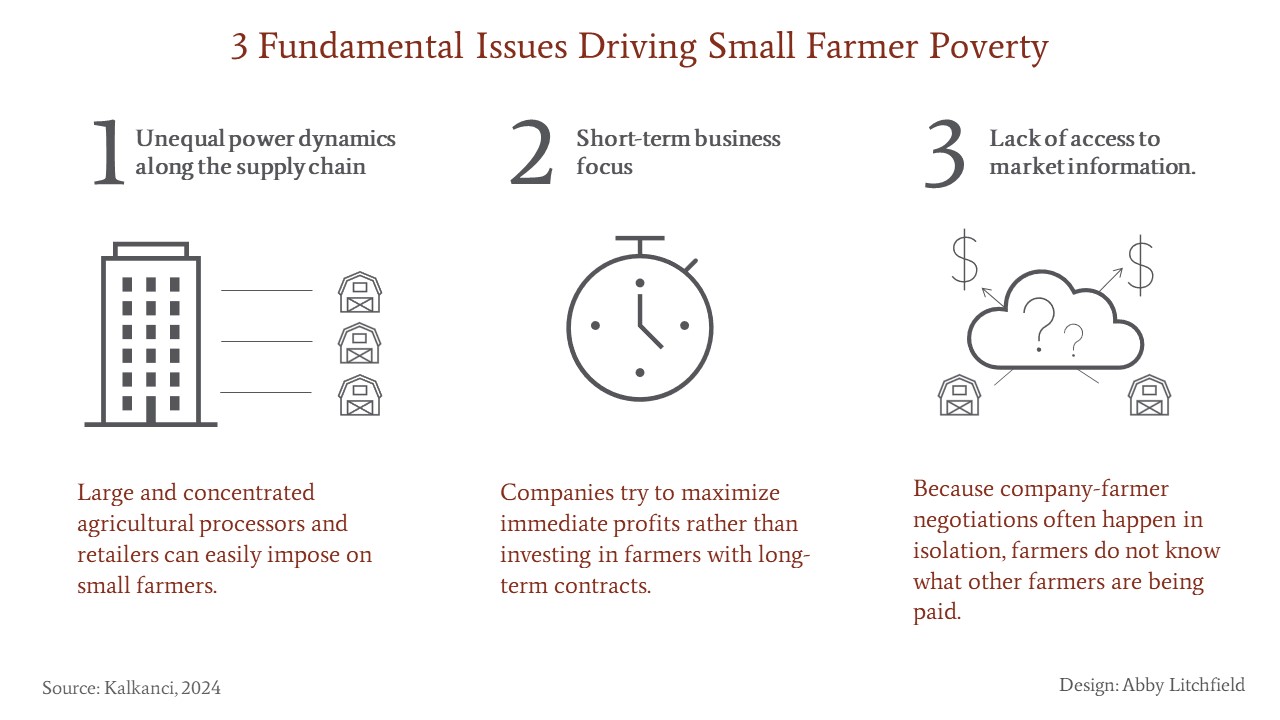Small farmers are an important part of the food system, but they’re struggling. What should businesses and consumers do?
Basak Kalkanci is an Associate Professor of Operations Management at the Georgia Institute of Technology Scheller College of Business.
Small farmers have a big impact on the food system. Farms less than two hectares (5 acres) produce an estimated one third of the global food supply. Small farms are particularly important for crops like coffee, cocoa, and fresh fruits and vegetables.
Too often, though, these farmers can’t make a living. Smallholder farmers are a large proportion of the world’s poor, living on less than $2 a day. That’s largely because they receive only a small portion of the revenue from the goods they produce. For example:
-
-
Cocoa: Of $3.49 spent on an organic chocolate bar sold at Target, the cocoa farmer has received 3 cents.
-
-
-
Fair trade coffee: Coffee retails for up to $20/ pound, but farmers earn $1.30 per pound
-
Money instead goes to other players in the agricultural food system. Farmers are at the beginning of a long value chain that includes the companies sourcing from them, processing crops, and transferring products to retail outlets. Processors or wholesalers set the price for the farmers – and it’s usually not enough.
Farmer poverty has business and human costs
When farmers don’t make enough money, their families and communities struggle. Consequences include hunger, lack of education, and poor health.
Businesses throughout the supply chain can also face consequences. Poor farmers can’t pursue opportunities to increase productivity or invest in more sustainable practices. For example, without capital and credit, they can’t buy fertilizer or other technologies that might improve their crops – and keep global supplies steady. Businesses also see demand from consumers for socially responsible products that don’t impoverish farmers.
Solutions to farmer poverty do exist, and could advance environmental sustainability as well. However, these solutions are not quick or easy; they require major changes to the agri-food system.
In this article, I describe one strategy that my colleagues and I studied and what it tells us about solving the problem of farmer poverty.
Examining a Potential “Quick Fix” to Small Farmer Poverty
With my colleagues Saed Alizamir (University of Virginia) and Foad Iravani (Walmart Global Tech), I studied one approach to financially supporting small farmers. It’s a process where consumers can “tip” farmers when they purchase a product.
It’s kind of like the “tip screens” increasingly common in coffee shops, where you have the option to provide a tip to the service personnel. But here, the person you’re tipping could be thousands of miles away, at the beginning of a very long food chain.
Introduced in 2019, the tipping strategy got positive attention and strong corporate backing. Accenture, MasterCard, Amazon Web Services, and Mercy Corps collaborated on the effort. Similar apps have since joined the market, including “Thank My Farmer,” from Farmer Connect and IBM.
This tipping is made possible by blockchain technology, which stores data about a product’s travel through the supply chain. When the product reaches the store, it can be linked back to the original farmer, and customers can “tip” that farmer through an app.
My colleagues and I studied an example of tipping for a sustainable product, using mathematical models of farmer, consumer, and company behaviour. We asked:
-
-
Does tipping raise small farmers’ income?
-
-
-
Does it lead to a more secure supply chain (by more farmers opting to provide the sustainable crop)?
-
Our conclusion was that while tipping seems like an easy fix to the problem of farmer poverty, it doesn’t actually hold up in implementation.
In our study of tipping, we modeled three likely scenarios. In two of these cases, some or all farmers ended up worse off financially in the tipping scenario. That’s because agricultural companies took advantage of the increased money farmers were receiving – and lowered the wholesale price they paid farmers. Tipping also consistently increased inequality among farmers: Farmers whose products are sold to “tipping” customers could earn a lot more than those whose products are sold to “non-tippers”.
Tipping also puts a burden on customers. So, if it doesn’t meaningfully improve supply and farmers’ earnings, it’s not a useful strategy – at least as currently designed.
Focusing on Fundamental Challenges Driving Farmer Poverty
Rather than pursuing “quick fixes,” I’d like to see us grapple with the big challenges in the food system — thedeep issues which drive farmer poverty and contribute to environmental harm. Keeping these in focus can help us come up with meaningful solutions.
Here are 3 central challenges driving farmer poverty:
Unequal power dynamics along the supply chain. Large and concentrated agricultural processors and retailers can easily impose on small farmers, who are rarely organized. Four companies control 70% of the global grain trade, for example (Clapp, 2022). In the face of this, farmers lack bargaining power.
Lack of access to market information. Farmers do not know what other farmers are being paid, because sourcing negotiations typically occur in a vacuum. They also often don’t know what to ask for based on the quality of their product, the total volume etc. There are efforts to standardize and share market information, such as the Specialty Coffee Transaction Guide. And “living income benchmarks” for farmers aim to educate the market on what prices could (or could not) sustain a living.
Short-term business focus. Companies try to maximize immediate profits – e.g. by lowering wholesale prices – rather than investing in farmers for the long-term. Short term contracts mean no reliable capital for farmers to invest in better practices or a long-term future.
Identifying these issues shows the scale of the challenge. But while we need to keep focused on the big picture, small actions can still help. As a thought experiment, my colleagues and I considered how the tipping mechanism might connect to/ reflect some of these broader challenges.
What Would Better Tipping Look Like?
Tipping does not necessarily help address the root cause problems. But, in some conditions it can make a positive impact. For example:
-
-
Processors and retailers can commit to keeping the same minimum wholesale prices and to maintaining the same farmer base over time, so that farmers who receive tips don’t face income losses as well.
-
-
-
Such commitments can be verified by third-parties and shared with the public as part of firms’ broader move towards transparency
-
-
-
Education could help consumers understand small farmers’ financial conditions and their need for additional money. But education without solid commitments from processors/ retailers to improve these conditions is unlikely to succeed, and can even hurt companies’ image and reputation.
-
Some crops might be more “ripe” for adopting this strategy, depending on their location, market conditions, and how easy it is to trace goods back to the producer in the supply chain.
A Future for Farmers and Food
For me, financial sustainability of farmers is personal because many families in my home country of Turkey have close generational ties to farming. My own grandparents made a living from farming in their early lives.
Farming once presented a path for upward mobility. My grandparents used their farming income to shift to other careers as well as to support their children’s education. And farming can be a meaningful career in itself.
But the way prices are determined for farmers makes farm life less possible, and I see price pressure worsening over time. With farmers unable to cover the costs of production, even their basic survival needs are on the line. This affects us all: When smallholder farmers can’t make a living, their countries are at risk of higher criminality and poverty, switching to illicit crops, and mass migration.
My hope is that by understanding the big picture, and by taking concrete steps, we can make positive change.
Read the paper: Alizamir, S., Iravani, F., & Kalkanci, B. 2022. Tip Your Farmer? Implications of Tipping in Agriculture on Sustainability and Financial Inclusion. Available at SSRN.
Find Out More about Sustainable Agriculture
Kim, H., Fischhoff, M., & Litchfield, A. 2022. What is Regenerative Agriculture? Network for Business Sustainability.
Jain, S. 2023. When Does the Circular Economy Improve Agri-food Sustainability? Network for Business Sustainability.
Hicks-Webster, C., & Gualandris, J. 2022. How Can Businesses Adapt to Climate Change? Network for Business Sustainability.




Add a Comment
This site uses User Verification plugin to reduce spam. See how your comment data is processed.This site uses User Verification plugin to reduce spam. See how your comment data is processed.